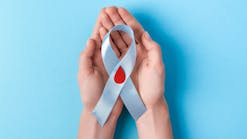Clinical research led by Indiana University School of Medicine investigators and their collaborators in Uganda has revealed that hydroxyurea significantly reduces infections in children with sickle cell anemia.
The group’s research, recently published in the journal Blood, revealed that hydroxyurea treatment resulted in a remarkable 60% reduction in severe or invasive infections, including malaria, bacteremia, respiratory tract infections and gastroenteritis, among Ugandan children with sickle cell anemia.
While hydroxyurea has had U.S. Food and Drug Administration approval as a sickle cell disease treatment for children since 2017, its accessibility and acceptance in Africa have been comparatively limited. As hydroxyurea has become more recognized in African countries for its effectiveness in treating sickle-cell-related complications, Dr. Chandy John and his colleagues noticed a knowledge gap about the treatment’s effect on infections. This led the research group to incorporate hydroxyurea treatment and analysis into their established clinical trial, Zinc for Infection Prevention in Sickle Cell Anemia.
During the study, the researchers examined the effects of hydroxyurea on 117 children in Uganda and focused on a range of infections. After hydroxyurea treatment, results showed a substantial decrease in the incidence of these infections. Additionally, eight of the nine deaths that occurred in the trial were children whose parents declined hydroxyurea treatment. The only death in a child on hydroxyurea treatment occurred four days after starting treatment, providing insufficient time for hydroxyurea to have an effect.
Of the five children for whom a cause of death was known, all five died of infectious causes. The high death rate in the study, despite expert clinical care by study personnel, provides further evidence of the urgent need for additional interventions to decrease mortality in children with sickle cell disease in Africa.





